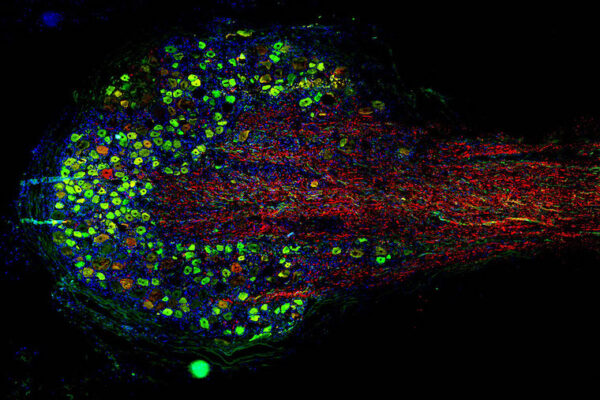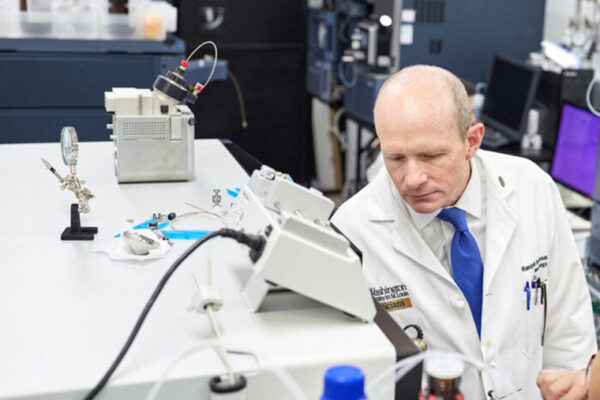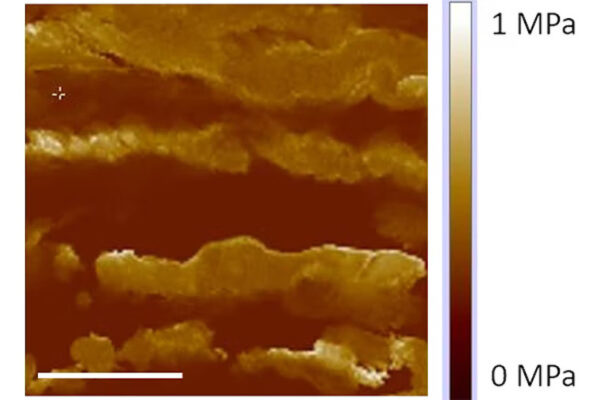Scientists at Washington University School of Medicine in St. Louis were awarded $569 million in research grants from the National Institutes of Health (NIH) in federal fiscal year 2022, elevating WashU to No. 3 among U.S. medical schools in total NIH research funding support. The new ranking surpasses last year’s impressive research successes, when WashU Medicine rose to No. 4.
Remarkably, WashU Medicine capped its momentous year in biomedical research despite the ongoing challenges of the COVID-19 pandemic. Since 2016, when NIH research funding to WashU Medicine totaled $374 million, support has grown by 52% with more than 120 new NIH-funded investigators.
“No. 3 is an incredible achievement,” said Chancellor Andrew D. Martin. “WashU Medicine is known worldwide for the caliber of its biomedical research. Many of our researchers are leaders in their fields, and their programs provide an incredible training ground for students and trainees who are just starting careers of their own.”
NIH support makes up the majority of extramural grants for research at WashU Medicine. With grants from other sources — including foundations, donors and government agencies such as the Centers for Disease Control and Prevention — as well as institutional support and collaborations with industry, research investments at WashU Medicine in 2022 totaled almost $1.2 billion.

“This success is particularly meaningful given that over the past three years, the pandemic has posed immense challenges not just for our physicians, nurses and trainees who risked their lives to care for patients, but also for our researchers,” said David H. Perlmutter, MD, the George and Carol Bauer Dean of WashU Medicine, executive vice chancellor for medical affairs, and the Spencer T. and Ann W. Olin Distinguished Professor. “COVID-19 disruptions created numerous obstacles for our researchers faced with keeping their labs running and advancing the science that expands our knowledge of human health and disease. Yet, our research faculty, postdocs, graduate students and other trainees, and our support staff – literally thousands of individuals here at WashU Medicine – persevered to drive forward our mission to advance knowledge and health through research, even as they made great personal sacrifices during the strain of the pandemic.”
In the 2022 federal fiscal year rankings of NIH funding, the medical schools at the University of California, San Francisco, and Stanford were No. 1 and No. 2, respectively, with the medical schools at Johns Hopkins University and the University of Pennsylvania rounding out the top five.
WashU Medicine’s No. 3 ranking in NIH research funding reflects the quality and rigor as well as the breadth and depth of the school’s research efforts. The bulk of NIH dollars to WashU Medicine funds innovative, investigator-initiated research projects aimed at answering pressing questions in science and medicine. NIH grant applications go through an intensive peer-review process, and only about 30% of projects are selected for funding. NIH grants are particularly sought after because they also include the most significant level of funding for the facilities and infrastructure that makes research possible, unlike grants from many other organizations.
An important part of WashU’s mission is elevating and nurturing the careers of the next generation of outstanding research faculty, particularly women and those underrepresented in medicine and biomedical sciences, who will carry on the tradition of research excellence. Each year, an estimated three dozen or more early-career scientists at WashU Medicine receive their first R01 grants. These grants provide up to five years of support and are a milestone achievement. Among the faculty who recently received a first R01 grant is Guoyan Zhao, PhD, an assistant professor of neuroscience. The grant supports Zhao’s research into neurodegenerative conditions such as Parkinson’s disease and Lewy body dementia.
“I was so thrilled that my grant was funded after the first submission,” she said. “There is so much to learn about how neurodegenerative conditions develop, such as why degeneration occurs in certain parts of the brain and not others, and why certain types of neurons are more vulnerable to damage than others. This kind of information is crucial for learning how to prevent and treat neurodegenerative diseases.”
NIH grants support research in many different areas, and the breadth is exemplified by prominent studies such as the Adolescent Brain Cognitive Development Study, which investigates how life experiences, along with a child’s changing biology, affect brain development; a major project to develop and evaluate a broadly protective vaccine against coronaviruses, including all variants of the virus that causes COVID-19; and long-running international clinical trials evaluating therapies for inherited Alzheimer’s disease. NIH support also enabled WashU Medicine physician-scientists to establish a Pediatric Center of Excellence in Nephrology to study the genetic and molecular underpinnings of childhood kidney disease and improve care for children with such diseases; a Center for Perioperative Mental Health to study ways to identify and treat depression and anxiety in surgical patients; and a Silvio O. Conte Center for Basic Neuroscience Research, one of 15 awarded by the National Institute of Mental Health, to advance research into neurosteroids as treatments for depression and other psychiatric disorders.
In just the past two years, research led by NIH-supported WashU Medicine scientists has been translated into a nasal vaccine for COVID-19, now authorized for use in India and under development in the U.S.; a blood test for Alzheimer’s disease that can be used as a low-cost, easily accessible alternative to expensive brain scans and invasive spinal taps; and a brain-computer interface device designed to help chronic stroke patients retrain their brains to gain more use of their hands and arms.
Success in NIH funding is an objective measure of scientific competitiveness, because grant applications undergo extensive peer review. It also is used by many medical schools as a metric for benchmarking research capabilities, because the data is available through the public NIH website and therefore entirely verifiable. Other rankings, such as those developed by U.S. News & World Report, use research metrics that cannot be verified by databases available to the public. This is one reason, among other very important ones about medical education, why WashU Medicine and other leading medical schools have withdrawn from participating in U.S. News & World Report’s annual “Best Medical Schools” survey and ranking. The medical schools at Harvard University, Stanford University, Columbia University and the University of Pennsylvania among others also have challenged the U.S. News rankings’ validity and have decided to no longer submit data to U.S. News & World Report.
“We believe in the value of research for advancing knowledge and improving health,” Perlmutter said. “Grants are not the object of our research mission, but they provide the bulk of the funding, and NIH funding, in particular, reflects the competitiveness and quality of our science. This isn’t about bragging rights, although I’m never shy about bragging about the amazing people we have at the med school.
“Holding a spot in the top tier of NIH funding means we have the resources and the talent to do the most innovative, potentially transformative research,” he said. “It means we can recruit the best scientists to join and enhance our community. It creates increased opportunities for collaboration with biotech and pharma companies. It is all part of the virtuous cycle of academic medicine: Great research leads to improvements in human health and patient care, and brings in funding for more research.”
Having such a flourishing research community at WashU Medicine has wide-ranging benefits. Clinicians have access to the most up-to-date medical knowledge and cutting-edge technologies, so they can provide the best possible care. Patients benefit from advances in preventing, diagnosing and treating disease. Students and trainees have access to world-class research opportunities and educators who are leaders in their fields. Federal and other outside funding for research injects dollars into the local and regional economies, helping to grow our city and our region. Some NIH-funded discoveries can be licensed by the university and commercialized, transforming research dollars into concrete improvements in preventing, diagnosing and treating disease. In this way, NIH funding benefits patients at our hospitals and clinics and around the world.
“We measure the success of the medical school on multiple metrics, and research funding is just one,” Perlmutter said. “Clinical care outcomes, quality of medical education, ability to provide care to the local community and contributions to the local economy are also key indicators. Despite metrics that illustrate our strong performance in these areas, our culture at WashU Medicine means that we’re always learning, growing and finding ways to improve what we do.
“Three years into the pandemic, our researchers continue to produce outstanding science, publishing many papers in top-tier journals every week, and our clinicians continue to provide exceptional care,” he added. “The dedication, perseverance and innovation of our faculty and staff during such a challenging time say a lot about what makes the School of Medicine such a special place and a leader among medical schools.”
About Washington University School of Medicine
WashU Medicine is a global leader in academic medicine, including biomedical research, patient care and educational programs with 2,700 faculty. Its National Institutes of Health (NIH) research funding portfolio is the fourth largest among U.S. medical schools, has grown 54% in the last five years, and, together with institutional investment, WashU Medicine commits well over $1 billion annually to basic and clinical research innovation and training. Its faculty practice is consistently within the top five in the country, with more than 1,790 faculty physicians practicing at over 60 locations and who are also the medical staffs of Barnes-Jewish and St. Louis Children’s hospitals of BJC HealthCare. WashU Medicine has a storied history in MD/PhD training, recently dedicated $100 million to scholarships and curriculum renewal for its medical students, and is home to top-notch training programs in every medical subspecialty as well as physical therapy, occupational therapy, and audiology and communications sciences.



